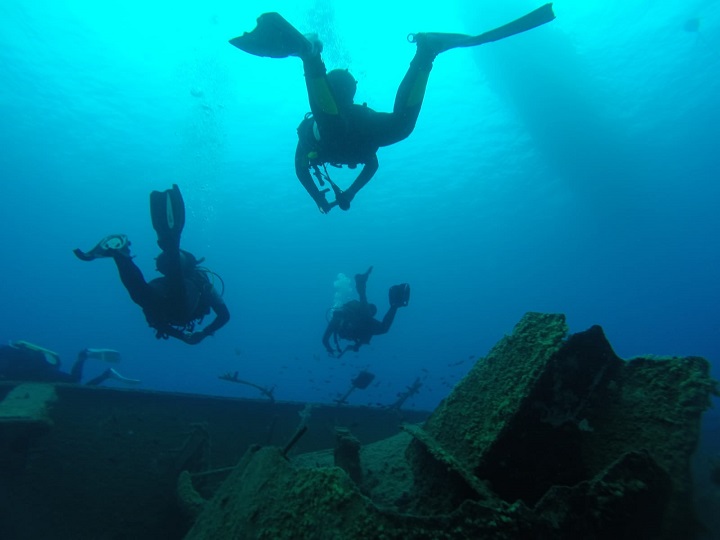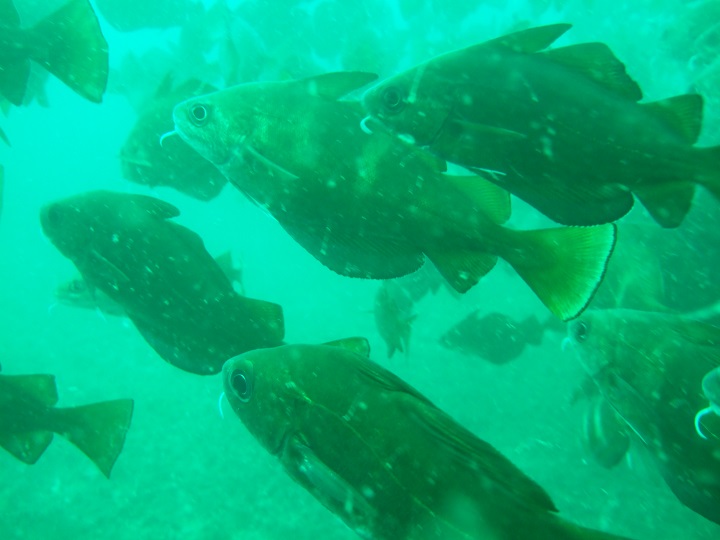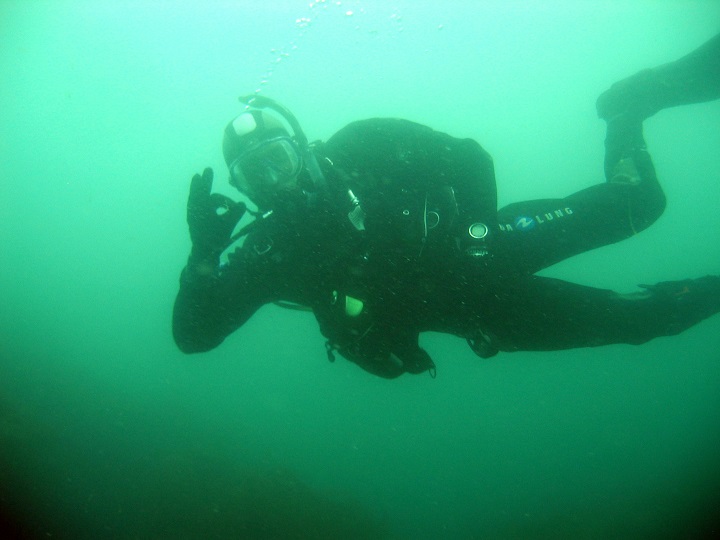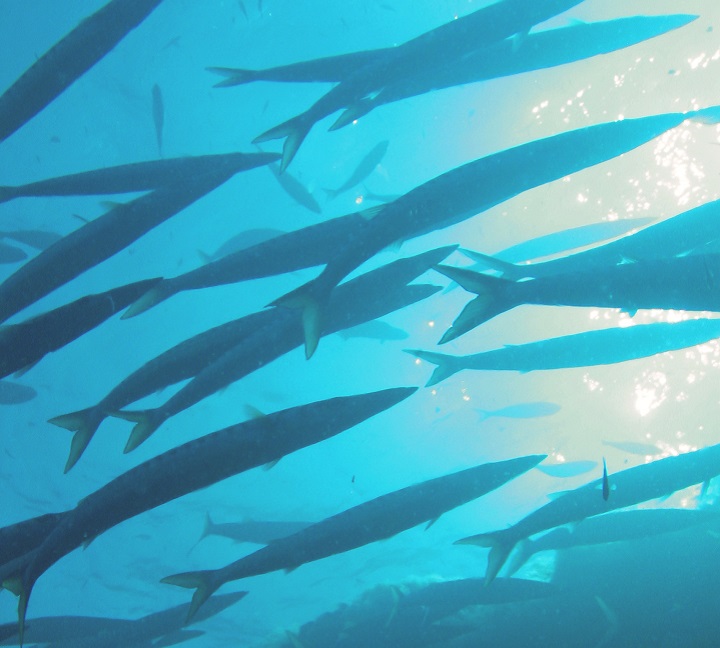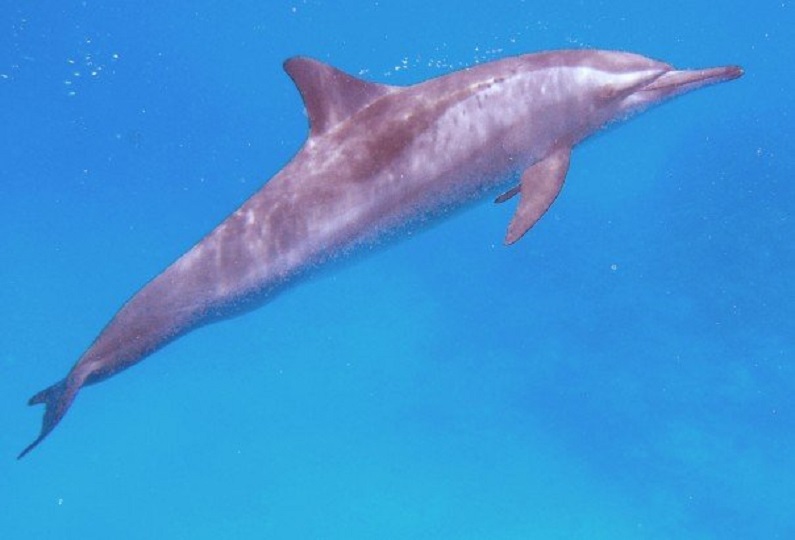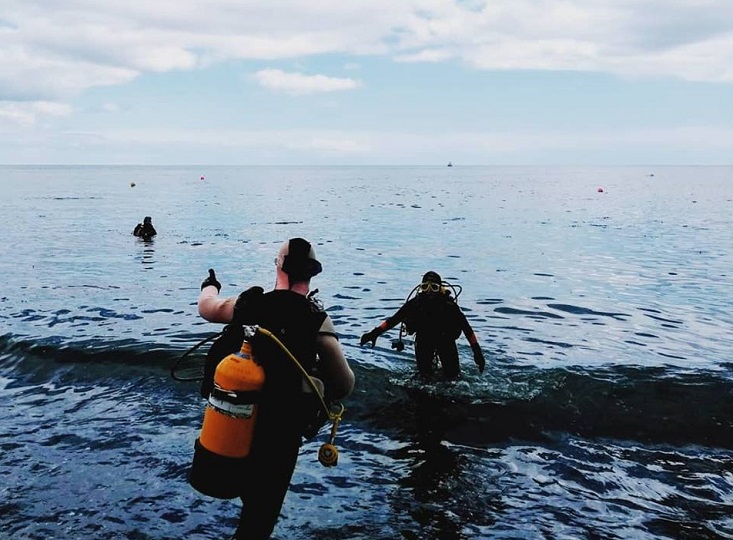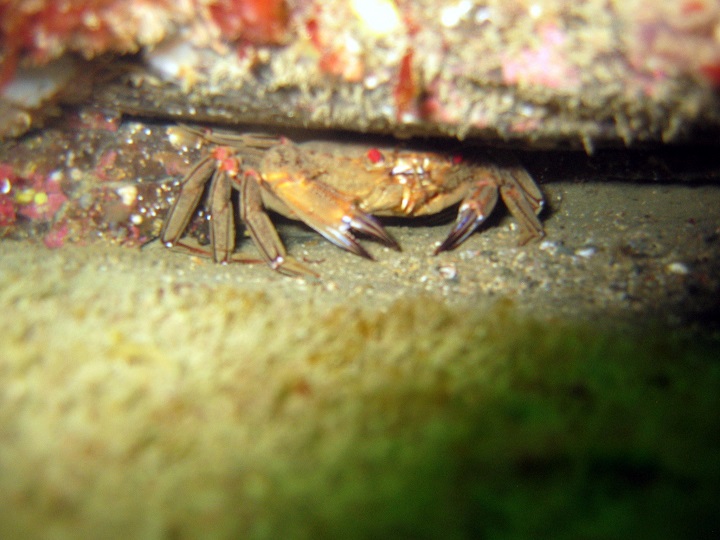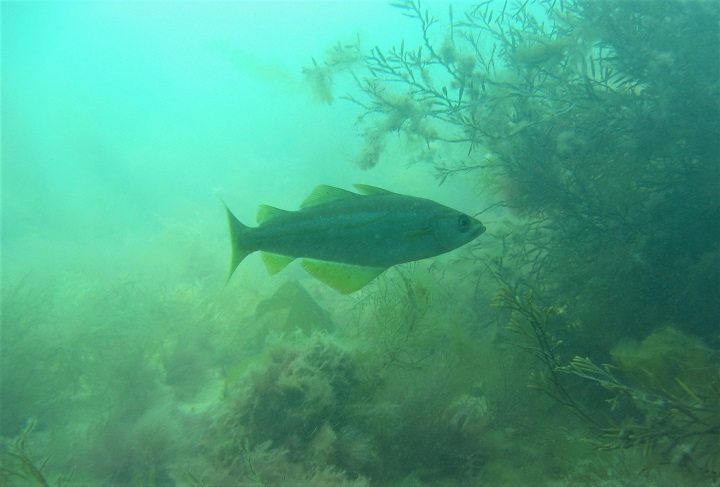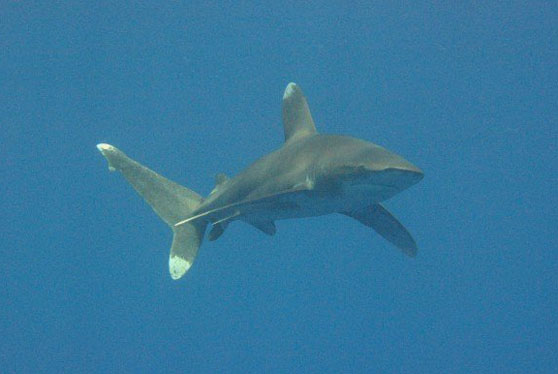There are a lot of misconceptions out there about scuba diving which does tend to put people off learning this wonderful sport of ours so below are 20 of the most common myths about scuba diving debunked. I hope you enjoy the read and if you have any other questions about scuba diving or learning to scuba dive please feel free to contact us here at Underwater Adventures
1. You can run out of air
We’re starting this list with probably the biggest fear people have about diving. You are relying on your air tank to breathe and that means it is indeed possible to run out of air. If you think about it though it's just the same as driving your car, after a while, you will run out of fuel int eh car if you don’t fill up and the way you avoid that being an inconvenience it to keep an eye on your fuel gauge and it is just the same in scuba diving, just keep an eye on your contents gauge and you should never run out of air while underwater. Plus, the PADI open water course teaches you exactly how to deal with situations like this like how to make a safe ascent using your buddies alternate air source. You will always be diving with a buddy who will be able to supplement your air supply long enough to end the dive and surface safely. We may not be debunking this myth but reassuring you that there are procedures in place that you will learn so you can calmly deal with an ‘out of air’ situation.
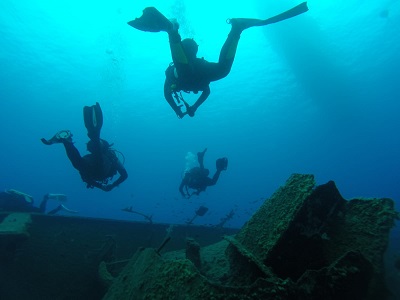
2. Sharks are scary
Sharks have a terrible reputation for being the most vicious predators in the sea. Yes, they are at the top of the food chain, but this doesn’t mean they want to tuck into every diver that enters their habitat. In fact, most shark attacks are a case of mistaken identity, for example, surfers that sharks mistake for a tasty seal. It is incredibly rare for divers to be bitten by a shark (the chances are so small in fact nobody has even bothered to work out the percentage for scuba divers but I have found this interesting website which gives you the odds of being bitten around the world so click here to take a look) Sharks are incredible to watch in their home environment and once you have learned to scuba dive you will start to see just how beautiful and amazing sharks and will end up wanting to scuba dive with them.
3. You need a lot of gear just to learn
Scuba diving does require gear, but you should be lent all the equipment you need to learn included in your first course so that you can learn to scuba dive without having to buy lots of equipment. We do recommend that you buy your own mask, wetsuit, and fins as these are rather personal bit of equipment and finding the right fit is important, especially your wetsuit as this is the thing that will keep you warm, but you don’t have to buy them as they are all included in the PADI open water course offered by Underwater Adventures.
Once you get certified, you can begin buying your own gear, as your budget allows. Until then, rent your gear. Rental gear is high-quality and well maintained — plus renting gives you the chance to see what brands you prefer. You can see the rental prices by clicking here and as you will see it's not that expensive, which brings us on to the next point.
4. It’s expensive
Getting your PADI Open Water Diver certification is about the same price as having the equivalent amount of time in golf lessons and at least with the PADI open water course will end up with an internationally recognized certification afterward. With this certification, you can dive anywhere in the world up to 18m. This may be the only PADI course you choose to do, or you can go on to higher skill levels. Yes, dive gear can be pricy, but with proper care and storage, it will last year’s even if you are an avid diver. Of course, you can also choose not to buy your own gear to save that outlay but your dive trips may have the added cost of renting gear. If you ask any diver, I bet they’ll tell you that their PADI certification and learning to scuba dive was 100% worth every penny.
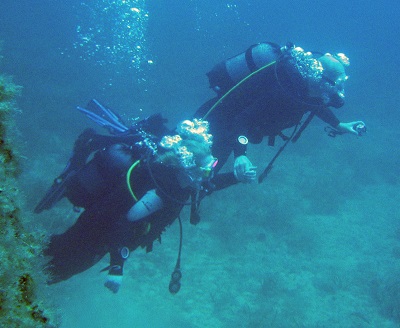
5. Scuba diving isn’t exciting (or it’s too exciting)
You get to determine the level of excitement in every dive. You can spend a lifetime of diving in calm water, gliding over beautiful coral reefs and looking at pretty tropical fish — those kinds of peaceful experiences are amazing and the norm. But if you crave action and adventure, scuba diving can deliver that, too. Try diving with sharks in the Galapagos, exploring the passageways of a flooded cave, or entering a sunken World War II battleship. You’ll find a host of advanced training opportunities to suit the kind of diving you want, including cave, wreck, and yes, even heli-diving.one of the best things about scuba diving is that it is fun as you will be doing something you enjoy with people who enjoy it with you, even the courses are fun with courses such as the Zombie apocalypse diver course where not only do you get to play with Zombies underwater but you will get a qualification with it where in your picture you are made up to look like a Zombie, this is a valid certification so you can show it at dive shops around the world to prove you are a diver if you like.
6. You can’t dive if no one you know dives
Diving is one of those amazing sports that brings people together from every walk of life. If you want to dive but your friends/family/partner have no interest, don’t worry! You will always find a dive buddy in the scuba diving community. The underwater adventures dive club is full of people who want to scuba dive all the time so even if you work odd hours you will be able to find a buddy to scuba dive within the dive club, you will never be lonely. Divers love to talk, make friends, compare dives and share their experiences. You could become part of one incredible group of humans.
7. It’s time-consuming
Many people assume that learning something skilled like diving takes a long time. This myth can be debunked because the diving part of a PADI Open Water Diver Course takes as little as 3 days! The majority of your course work can now be done online at your own pace so your theory is almost all out of the way before you even do the practical work. You could be diving in just a few days! That being said it can often better to take your time so you can learn at your own pace and so here at Underwater Adventures we offer flexible learning with unlimited pool sessions so you can learn as quickly or take as much time to learn as you need, we will try our best to fit it around your needs.
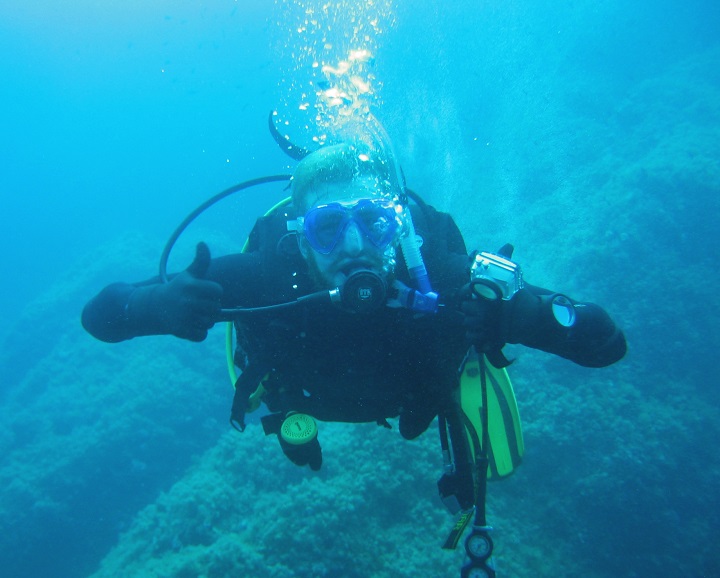
8. You must be good at studying and remembering the procedure
Some people worry that they won’t be able to follow or remember all the PADI Dive procedures. PADI dive instructors like those at Underwater Adventures are professional teachers and will walk you through every single step of diving. There are very simple steps to follow before, during and after every dive you do and as you practice them on your first few dives, they will become automatic. It’s not unlike driving a car in the way that you may find it very strange at first, but it very quickly becomes second nature.
9. Diving is only for people who live near the ocean
No matter where you live, chances are there’s a dive shop and a popular dive site somewhere nearby. In many cases, a local lake, spring or quarry is where people learn to dive — and it’s often where divers continue to dive, in addition to taking tropical dive vacations. Scuba diving is not just a sport, it’s a very social activity. So even if your local swimming lake isn’t the Caribbean or Great Barrier Reef, a Bacon Butty, a cup of steaming hot tea, a couple of tanks of air and a few dive buddies can make for a day of fun.
7. It’s only for super fit people
Anyone from 10 years upwards can learn to dive. If you have a serious condition that you visit your doctor about, you will already know if scuba diving is safe for you or not. If you worry that you may not be fit to dive, visiting your doctor to make sure is the best way to find out. Lung function and cardiac stress tests are recommended for older people or those with asthma, pulmonary fibrosis, cystic fibrosis, and COPD who would like to learn to dive. If you are not sure please follow this link to the standard PADI dive health questionnaire.
8. It’s claustrophobic
Claustrophobia or panic attacks are a big fear for some people thinking about diving. In fact, being underwater is actually proven to be one of the most relaxing things you can do. The serenity of floating and swimming and watching marine life is extremely calming. In fact, most people who have the fear of becoming panicky or claustrophobic report completely forgetting about the fear once they are underwater. You must also remember that your dive instructor is a professional and will take care of you every step of the way. You are never left on your own while diving.
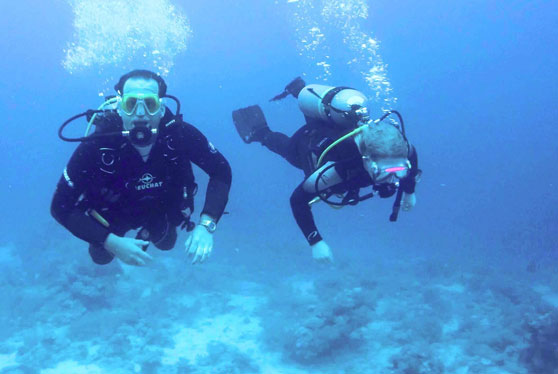
12. Diving is a macho sport
Well, if by macho you mean male-dominated, we admit that this was true when Sea Hunt was still on TV (1958-1961). But fast-forward to this century, and ask Jessica Alba (Into the Blue), Kate Hudson (Fool’s Gold) and Nina Dobrev (Vampire Diaries) what they love about being underwater. Or ask the countless female instructors, divemasters, boat captains and resort owners who work as scuba divers every day. PADI even runs special events to help encourage more women into the sport like women’s dive day
13. Snorkeling is just as good as scuba diving
Snorkeling in the ocean and looking down on the reef from above is sort of like looking at fish through the glass of the tanks at an aquarium. It’s fun, but it’s just not the same as being on the reef and seeing all its wonderful, surprising marine life, plus you will get to see so much more when you are actually down with the fish.
14. I can’t dive. I have (insert name of the medical condition here)
It is true that some conditions, such as seizure disorders, will keep you out of the water. If you’re worried about diving with your particular medical condition, consult the dive medicine experts at Divers Alert Network (DAN). They can help you better understand the physical demands of diving and how it relates to your health. Call their non-emergency questions line at (+44)-20-70991979 or you can find your local office by following this link.
15. The sea is a scary place
Many people have a fear of the unknown and therefore diving can seem so scary. However, once you are trained and underwater diving you will be so busy looking at all the magical underwater sights, you won’t have time to be scared. Once the unknown becomes something you can’t wait to explore it’s not the unknown anymore is it!
16. You need to be a fantastic swimmer
Of course, as a diver you need to be able to swim, but only basic swimming skills are necessary. You will need to be able to swim 200 metres but there is no time limit so you can go at your own pace and use any stroke you like. It is just to make sure you are comfortable in the water. As a diver, you will be trying to expend as little energy as possible hence using fins to create greater thrust and faster speed with little effort.
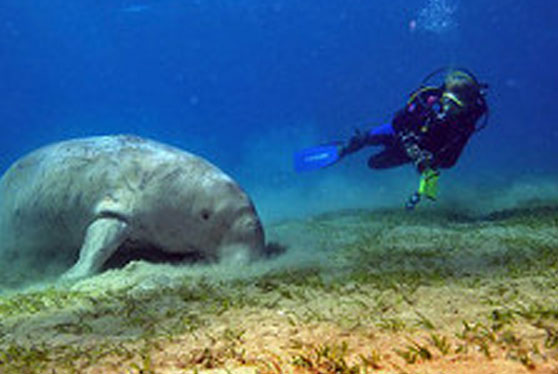
17. Diving is only for people who live in the tropics
There are few things that rival the experience of being suspended weightlessly in warm, clear tropical water while floating effortlessly along a colorful coral reef. Unless, of course, it is the experience of drifting through a California kelp bed with a pod of sea lions. Or exploring the amazingly preserved ruins of a world war two shipwrecks off the south coast. Or finding sunken treasures such as old perfume bottle and gold watches on the wreck of the Kyarra, the list goes on and on.
No matter where you are, chances are there's a popular dive site somewhere nearby. Don't believe me? Just ask anyone with the red and white diver down flag on his car. Lakes, quarries, rivers, flooded mineshafts — almost anywhere there's water, you'll find divers. Heck, outside of Abilene, Texas, you can even dive in a flooded underground missile silo. Each of these sites provides its own unique dive experience and a chance to get started in the sport. Not every dive site is for every diver, but scuba diving is not just a sport, it's also a lifestyle and a very social activity. So even if your local swimming hole isn't a world-famous dive site, it is still a get way to spend the day or weekend away.
18. You must dive deep to see anything interesting
One of the first questions non-divers ask scuba divers is, “how deep do you go?” Though some divers love the challenge of deep exploration, most divers stay within 18 metres where the water is warmer, colors are brighter, and your breathing gas lasts longer.
19. The only good diving is in the tropics
You can dive just about anywhere there’s water, including inland areas such as lakes, quarries, decommissioned mines. Some of the world’s best diving is found in cold-water environments such as British Columbia, Canada, South Africa, and here in the UK. Here in the UK, we have some of the best dive experiences in the world and just to prove it below I have put links to s couple of videos from our dives here in the UK.
Scuba diving with playful seals (Click Here)
Scuba diving in a Local lake with lots of things for scuba divers to explore (Click Here)
Playing with Blue sharks of the coast of Cornwall (Click Here)
20. Learning to dive is difficult/takes a long time
Forty (plus) years ago, learning to scuba dive required weeks of training. Students participated in military-style drills and learned skills that weren’t relevant for recreational diving. Since then:
The world recreational scuba training council (WRSTC) established standards for recreational diving training.
Dive computers simplified dive planning
Students can start their training anytime, anywhere and study at their convenience using digital course materials
You can get scuba certified as little as four days.
Debunked! You have no excuse not to try scuba diving now!
There are lots of preconceived ideas about diving, which is why there are so many scuba diving myths. Hopefully, we’ve given you a little more confidence and taken you one step closer to becoming a PADI certified diver.
If you have any other questions or concerns about diving, we haven’t addressed please feel free to contact us and we will be happy to talk them through with you. Click here for the details on how best to contact us.
.png)



